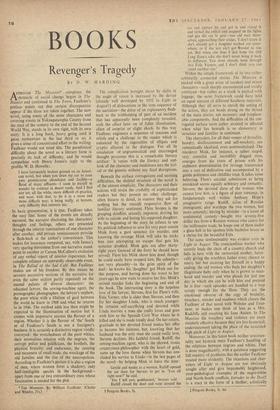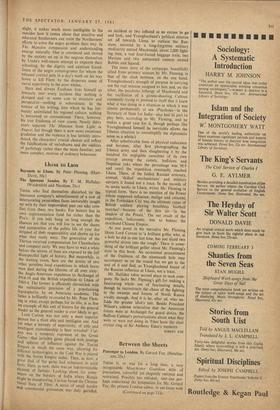BOOKS
Revenger's Tragedy
BY D. W. HARDING ALTHOUGH The Mansion* completes the chronicle of social change begun in The Hamlet and continued in The Town, Faulkner's preface points out that certain discrepancies appear if the three are taken together. The new novel, using many of the same characters and covering events in Yoknapatawpha County from the start of the century to the end of the Second World War, stands in its own right, with its own unity. It is a long book, heavy going until it gains momentum in the last third or so; it gives a sense of concentrated effort in the writing. Faulkner would not mind this. The paradoxical difficulty about the novel as a literary form is precisely its lack of difficulty, and he would sympathise with Henry James's reply to the prolific W. D. Howells:
I have fortunately broken ground on an Ameri- can novel, but when you draw my car to your own promiscuous abundance and facility—a flood of many affluents—I seem to myself to wander by contrast in desert sands. And I find 'our art, all the while, more difficult of.practice, and want, with that, to do it in a more and more difficult way; it being really, at bottom, only difficulty that interests me.
In basic presentation, it is true, Faulkner takes the easy line. Some of the events are directly narrated, the narrator disclosing the characters' thoughts and feelings, others are presented through the interior ruminations of one character after another, atid private reminiscences provide a flash-back at the author's convenience. This makes for looseness compared, say, with James's very sparing movement from one narrative stand- point to another or Carson McCullers's exclusion of any verbal report of interior experience, her complete reliance on outwardly observable event, in The Ballad of the Sad Café. But Faulkner makes use of his freedom. By this means he savours successive sections of the narrative (or even the same section partly repeated) on the mental palates of diverse characters: the educated lawyer, the sewing-machine agent, the pornographic photographer, the lawyer's nephew, the poor white with a lifetime of gaol between the world he knew in 1908 and what he returns to in 1946. The method adds less than might be expected to the illumination of motive but it creates with impressive success the flavour of a region. Whether it is the flavour of 'the' South or of Faulkner's South is not a foreigner's business. It is certainly a distinctive region vividly
conveyed: the wretchedness of the poor whites, their anomalous relation with the negroes, the corrupt police and politicians, the brothels, the physical brutality and endurance, the cunning and meanness of small trade, the wreckage of the old families and the rise of the unscrupulous.
According to Faulkner's picture it is also a region of men, where women form a shadowy, only half-intelligible species in the background— apart from one or two extraordinary ones whose fascination is needed for the plot.
*THE MANSION. By William Faulkner. (Chatto and Windt's, 21s) The complication brought about by shifts in the angle of vision is increased by the device (already well developed by 1932 in Light in Augustt) of dislocations in the time sequence of the narration—the delay of an explanatory flash- back or the withholding of part of an incident that has apparently been completely revealed, with the effect later on of fuller illumination, often of surprise or slight shock. In this way Faulkner engineers a sequence of tensions and reliefs and a challenge to the reader which is enhanced by the ingenuities of ellipsis and cryptic allusion in the dialogue. For all its simulation of ungrammatical and unarranged thought processes this is a remarkable literary artifact : it varies with the literacy and out- look of the character and modulates into the lyri- cal or the gnomic without any fatal disruptions.
Beneath the surface corrugations and seeming difficulties, the skeletal structure of the novel is of the utmost simplicity. The characters and their actions will strain the credulity of sophisticated readers but they present no other challenge; often bizarre in detail, in essence they ask for nothing but the smooth responsive flow of familiar literary sentiment. Flem Snopes is the ,grasping skinflint, sexually impotent, driving his Wife to suicide and hating his supposed daughter. At the beginning of the story he refuses to use his political influence to save his very poor cousin Mink from a gaol sentence for murder, and knowing the revenge Mink will take he tricks him into attempting an escape that gets his sentence doubled. Mink gets out after thirty- eight years (instead of the forty he should have served). Flem lets Mink shoot him dead, though he could easily have stopped him. He submits— not very plausibly—in the grim spirit of the duel : he knows his 'daughter' got Mink out for this purpose, and having done his worst to her years ago he now waits to receive her fire. Mink's second murder links the beginning and end of the book. The intervening story is the hopeless love of the lawyer, Stevens, first for Flem's wife, Eula Varner, who is older than Stevens, and then for her daughter Linda, who is much younger; he remains self-sacrificing and devoted while Linda marries a man she really loves and goes with him to the Spanish Civil War where he is killed and she is made totally deaf. On her return, gratitude to her devoted friend makes her offer to become his mistress, but, knowing that her husband was the only man she could really love, Stevens declines. His faithful friend, Ratliff, the sewing-machine agent, who is the shrewd, ironic countryman-philosophcr with the heart of gold, sums up the love theme when Stevens has con- cluded his service to Linda—in the last pages of the novel—by helping Mink to leave the state:
Gentle and tender as a woman, Ratliff opened the car door for Stevens to get in. 'You all right now?' he said.
'Yes I tell you, goddammit,' Stevens said. Ratliff closed the door and went around the
t Penguin Books, 5s. car and opened his and got in and closed it and turned the switch and snapped on the lights and put the car in gear—two old men them- selves, approaching their sixties. 'I don't know if she's already got a daughter stashed out some- where, or if she jest ain't got !round to one yet. But when she does I jest hope for Old Lang Zync's sake she don't never bring it back to Jefferson. You done already been through two Eula Varners and I don't think you, can stand another one.'
Within the simple framework of its two rather arbitrarily connected stories The Mansion is packed with a great array of incident and minor characters—each sharply encountered and vividly conveyed—but rather as a trunk is packed with luggage; the same framework could have held an equal amount of different' Southern materials. Although they all serve to enrich the setting of the action, they arc beads strung on the thread of the main stories, not necessary and irreplace- able components. And the difficulties of the cor- rugated surface seem rather strained or affected when what lies beneath is so elementary in structure and familiar in sentiment.
The characters, for all their veneer of brutality, bawdry, disillusionment and self-mockery, are romantically idealised, even sentimentalised. The murderer Mink, for instance, a rather stupid, very resentful and incredibly dogged man, emerges from his years of prison with his stubborn determination for revenge transmuted into a sort of dedication and accompanied by a gentle politeness and childlike trust. It takes some believing. Flem's suicidal submission to being murdered seems equally arbitrary and romantic. Stevens, the devoted slave of the woman who cannot love him, is a figure of pure romance, in fundamentals well within Anthony Hope's imaginatiVe range. Ratliff, scion of Russian immigrants; also worshipsthe two women, but more remotely; having by mistake--in a scene of sentimental comedybought two seventy-five dollar ties from a Russian woman who caters for 'the millionaire'trade, he keeps one of them under 'a glass bell in his spotless little bachelor house as a shrine for the beautiful Eula.
The same sentimentality was evident even in Light in August. The conscientious worker who secretly leads the choir of a country.church and falls in love with the unmarried mother, heroi- cally giving the worthless father every chance to marry her but securing her himself in a happy ending; the old woman who finds her daughter's illegitimate baby only when he is grown to man- hood and murder and who pleads for just one day in which she can be with him and pretend he is free--such episodes are handled in a way
syrupy enough for the films. They arc the emotional obverse of the orgy of brutality, .treachery, murder and madness which classes the Faulkner of that novel with Webster and Tour- neur, or makes one think of him as a Mrs.
Radcliffe still awaiting his Jane Austen. In The Mansion the treachery and violence are more sinisterly effective because they are less hysterical, understatement taking the place of the sustained high pitch of Light in August.
Moreover, in this 'latest book neither sentimen- tality nor hysteria mars Faulkner's handling of the relations between negrocs and whites. That is done magnificently, with a quietness suggesting full mastery of problems that the earlier Faulkner treated more stridently. The situations and char-
acters of Light in August are too obviously sought after and give improbably heightened, over-pathological examples of the negro-white and North-South conflicts. intruder in the Dusa is a tract in the form of a thriller; artistically t Penguin Books, 3s. 6d. slight, it makes much more intelligible to the outsider how it comes about that sensitive and educated Southerners can resist the Northerners' efforts to solve the negro problem their way. In The Mansion compassion and understanding emerge naturally. One is convinced and moved by the anxiety set up in the negroes themselves by Linda's well-meant attempt to improve their schooling; by the dignity and cautious friend- liness of the negro cotton-grower for whom the released convict puts in a day's work on his way home to kill Flem; by the desperate sense of racial superiority in the poor whites.
Here and always Faulkner lives himself so intensely into every incident that nothing is skimped and—at some cost to structure and perspective—nothing is subordinate. In the texture of his writing, into which he has inti- mately assimilated his regional culture, nothing is borrowed or conventional. There, however, his true freshness of view ceases. Nearly thirty years separate The Mansion from Light in August, but though there is now more emotional gradation and the violence is less lavishly intro- duced, the characters' crucial choices still reflect the falsifications of melodrama and the oddities of pathology rather than the more familiar, and more complex, motives of ordinary behaviour.











































 Previous page
Previous page